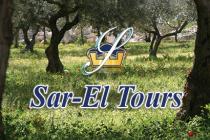The Garden Tomb: A Photo Tour of This Sacred Oasis in Jerusalem
"At the place where Jesus was crucified, there was a garden, and in the garden a new tomb, in which no one had ever been laid”—John 19:41.
With Easter approaching, our thoughts turn to the Resurrection: the central, world-changing event at the center of the Christian faith. Young and old, most Christian believers carry in their minds a vague idea of what the empty tomb must have looked like that Sabbath day in Jerusalem. But passengers on our Israel tours don’t have to rely on their imaginations, as our tour groups come face-to-face with biblical history at the Garden Tomb—which many believe could have been the site of the Resurrection.
Discovered in 1867 on the north side of Jerusalem, near an abandoned quarry outside the Damascus Gate, this destination has become one of the most popular pilgrimage sites in the ancient city.

The Bible refers to the site of Jesus’ Crucifixion as Golgotha, or “the place of the skull.” Over the centuries, a number of scholars and historians have speculated about the meaning of the name. One explanation that became popular in the 19th century theorized that the ancient Golgotha literally had natural features resembling a skull. The weathered rock cavities in the south side of this cliff face, standing above a bus station and known as “Skull Hill,” resemble the eye sockets of a skull. An execution site here would have been highly visible to residents of Jerusalem.
It’s located right next to the grounds of the Garden Tomb, and a viewing platform here helps visitors get a sense of the skull-like image. Could this have been the biblical Golgotha?

Further along the same outcrop as the “face” of Skull Hill, 19th-century archaeologists discovered an underground cavity. Next to it, ancient Christian symbols had been carved into the rock face. When the explorers made their way inside, they were greeted with other symbols that suggested the space had once been used as an ancient tomb. (The small window may have been hewn into the rock later.)

Now protected by a fence, the area where the body of Christ may have laid is marked with a red, stylized cross—a reproduction of the markings originally discovered here (the red pigment gradually faded upon exposure to the outside air). The Byzantine markings may date back to the 5th or 6th centuries, and include Greek letters that reference Jesus as the Alpha and Omega. Based on these factors, experts speculate that this location must have been a place of Christian reverence within just a few centuries of the Resurrection.

Matthew 28:6 describes the angel speaking to the women who sought the body of Jesus. “He is not here; he has risen, just as he said,” the angel told them. “Come and see the place where he lay.” These unforgettable words are carved into the door protecting the tomb’s interior.
While not the actual stone that would have been rolled in front of Jesus’ tomb, as described in Matthew 27:60, this carved, disc-shaped stone gives visitors a sense of the massive size of such closures in ancient times. It would have weighed around two tons.

More than just a peaceful, well-maintained garden, the Garden Tomb is a wonderful place for our tour groups to share Communion or spend time worshiping and reflecting. Imagine reading the story of the Crucifixion and Resurrection in the places where those incredible events likely occurred!

The beautiful grounds surrounding the tomb are managed by an organization based in the United Kingdom and maintained by volunteers from around the world. The manicured trees, plants and flowers here are breathtaking.
Regardless of whether the Garden Tomb is actually the place where Jesus was buried, it does meet many of the descriptions of this location from Scripture. That’s why thousands of believers visit here every year to grow closer to their Savior. At the very least, this lovely oasis helps us imagine what the Resurrection might have looked like.
We hope this brief photographic tour helps deepen your faith and adds a visual element to your worship as Easter nears. He is risen!

As we prepare to remember both the sacrifice and the resurrection of Christ, may these images bring the location to life. Jesus lived, died and rose again. He is RISEN!
He is RISEN INDEED!
May your faith be renewed and energized as you celebrate the forgiveness, freedom and life His sacrifice has provided for us.
Whether you are ready to visit or return to Israel, click below for a complete list of our upcoming Israel Tours. We have heard it time and again, a trip to Israel is life-changing.






